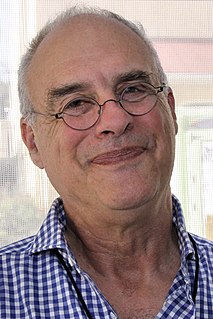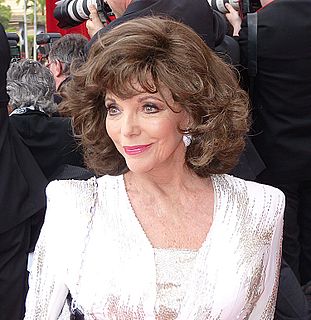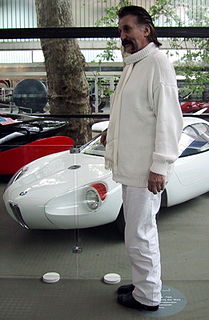A Quote by Mark Bittman
We are already eating less animal foods since a few years ago, but we are still eating 8-9 billion animals per year.
Related Quotes
If the age of the Earth were a calendar year and today were a breath before midnight on New Year's Eve, we showed up a scant fifteen minutes ago, and all of recorded history has blinked by in the last sixty seconds. Luckily for us, our planet-mates--the fantastic meshwork of plants, animals, and microbes--have been patiently perfecting their wares since March, an incredible 3.8 billion years since the first bacteria. ...After 3.8 billion years of research and development, failures are fossils, and what surrounds us is the secret to survival.
1973 was the first gasoline crisis in the world. That year, I designed the first aerodynamic truck, eating 40 percent less fuel. I put it on exhibit everywhere. It was 30 years ahead of its time. Nobody is building it today, and everybody still has problems with their boxy cars and trucks eating up fuel.
In fact, we would know ourselves that we are not meant to be meat eaters, and we would not have allowed ourselves to become conditioned to meat eating in the first place, if the effects of meat eating were felt right away. But since heart disease, cancer, diabetes, osteoporosis, etc. usually take many years to develop, we are able to separate them from their cause (or contributing factors) and go on happily eating an animal-based diet.
We believe in the Three Rs - reducing the consumption of meat and other animal-based foods; refining the diet by eating products only from methods of production, transport, and slaughter that minimize pain and distress; and replacing meat and other animal-based foods in the diet with plant-based foods.
We stopped eating meat many years ago. During the course of a Sunday lunch we happened to look out of the kitchen window at our young lambs playing happily in the fields. Glancing down at our plates, we suddenly realized that we were eating the leg of an animal who had until recently been playing in a field herself. We looked at each other and said, "Wait a minute, we love these sheep-they're such gentle creatures. So why are we eating them?" It was the last time we ever did.
There are many people who enjoy animal based foods and who have no interest in changing the way they eat. And as you correctly pointed out, animal products are an integral part of some ethnic groups and societies and it would be nearly impossible for them to change thousands of years of traditional eating habits.
People like to blame Mexican food, but look at what's happening globally, look at all the fast foods and products filled with trans fat. Before the Mexican Revolution, a hundred years ago, people were eating what now macrobiotics tells us to eat, corn, black beans, rice. That's what people were eating - and chile peppers. That's a healthy diet.


































